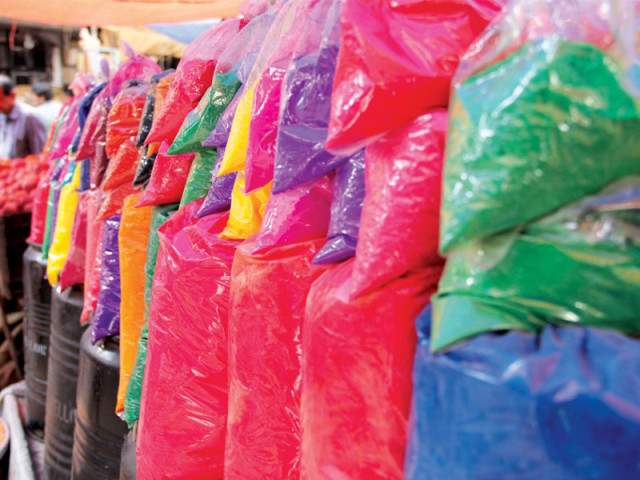Holi Hai!: How much happiness a little arrowroot flour and dye can bring
The coloured powder comes from Lahore and red and pink are the most popular.

“Seeing all these vibrant colours makes me happy,” said Ishtiaq, more popularly known as Raja by people who have known him for long. “Even the people who don’t buy the powder, stop to have a look at it.” Many of other rung sellers get their colour from Raja’s shop.
Raja says he gets the stock of colours from Lahore. There are nine shades of dry powder, purple, red, blue, pink, turquoise, green, brown, orange and yellow. But pink and red are the most popular, because according to Raja, people like bright colours.
Most of Raja’s customers are Hindus who buy the rung for Holi which will be celebrated today. On the day of the festival, the people light bonfires to honour Prahlad, a devotee of the god Vishnu, who was thrown in the fire by Holika. Prahlad escaped unhurt by the blessings of Vishnu but Holika, Prahlad’s aunt, was burnt and died. After prayers and the bonfire, the throwing of colours begins as the people shout ‘Holi Hai!’
Muslims also come to buy the rung and Parsis too as they use it during Navroz (The New Year festival) to decorate the entrances of their houses. They believe that the colours ward off evil.
Raja explains how the colours are made. “Earlier, the powder used to be made from chalk, but since it was dangerous, the manufactures stopped using it.” Now the colours are made from arrowroot flour, which is used in custard and pudding powders. Raw dyes are mixed in the flour with drops of spirit. He insisted that the dyes used are not the ones used for clothes.
“It’s like mixing cement. Obviously there are chemicals involved but not that much,” says Raja.
The powdered colours dissolve in water to make something like diluted ink.
The powder costs Rs230 per kilogramme. However, the ‘original colour’ which is dark green, is sold for a whopping Rs800 per kilogramme. “These colours come from China,” he says. “They are expensive because the colour does not wash off easily.” The people wash themselves with water and use bleach for the clothes.
Raja claims that it takes three days for it to wear off. The people who buy it are relatively affluent, coming from areas like DHA and Clifton.
Many of Raja’s customers set up their stalls outside the Swaminarayan Mandir. In the courtyard of the temple, Laloo Jeewan was covered in pink as he prepared little pouches of the rung. “A number of years ago, this small packet cost Rs2 but now it costs Rs20,” he said as an Indian Holi song played in the background. He also sold water guns and the pichkari, which is a plastic bottle with a nozzle that squirts the colour.
Hindu inmates spend Diwali, Shivrati, and Holi eating daal roti in their cells
For the Hindus languishing in the city’s jails, Holi, the festival of colours which is being celebrated today, will merely be an exchange of plain and colourless greetings. These inmates aren’t eligible for remission on religious occasions unlike their Muslim cell mates.
Teenaged Sumaith, a Gujrati Indian, has been behind bars for two months at the juvenile jail after he was arrested for straying into Pakistani waters. “We will be grateful if the government reduces my punishment,” he said. “I want to go home. We [used to] spray coloured water on each other while our mothers made special mithai.” He is one of 24 Hindus here.
Another inmate, Sanjay, has been here for six months and spent religious occasions eating daal-roti in his jail cell. “Diwali and Shivratri passed without any celebrations.”
This Holi, the jail has given the boys permission to hold a small event and let them smear a little colour on each other.
There are 300 Hindu prisoners in Malir jail. Just last month, President Asif Ali Zardari announced a remission in the sentences of Muslim prisoners for Eid Milad-un-Nabi (pbuh).
DIG Prisons Nusrat Hussain Mangan said relief is granted to minority inmates on religious festivals, but rarely. He does have the authority to grant a month’s remission but he didn’t say if he helped the minorities.
MPA Pitanber Sewani believed that there should be equal treatment for all the prisoners. “If Muslims are pardoned, then so should the Hindus,” he said. “There should be no discrimination.” rabia ali
Published in The Express Tribune, March 7th, 2012.


















COMMENTS
Comments are moderated and generally will be posted if they are on-topic and not abusive.
For more information, please see our Comments FAQ